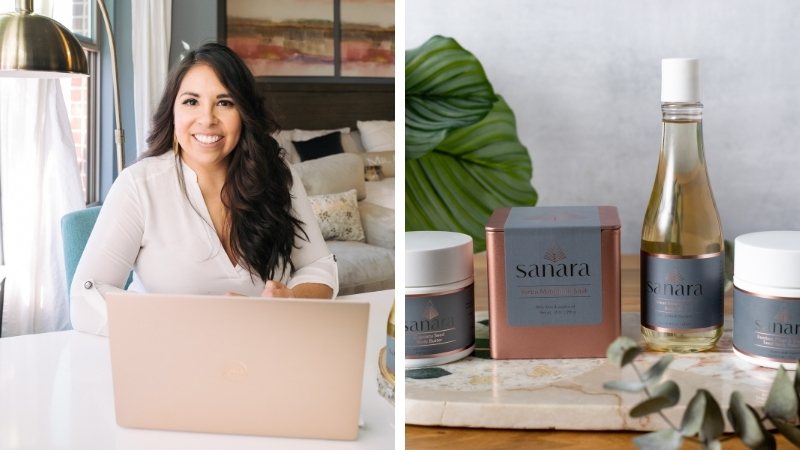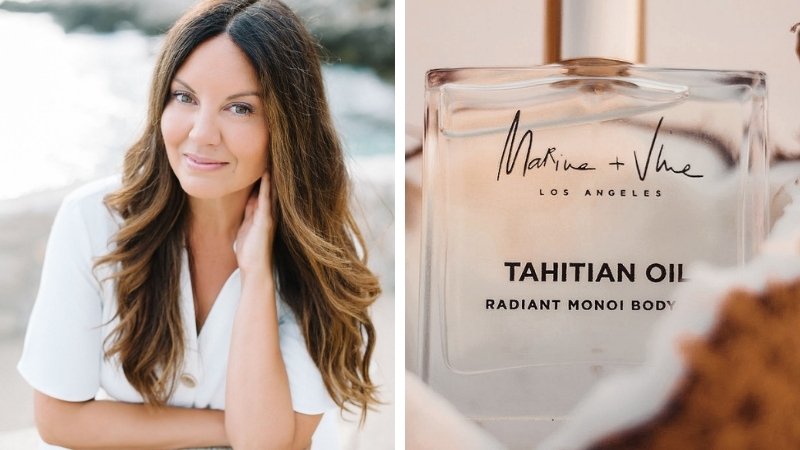When it comes to creating the next breakout beauty product, there are a lot of cooks in the kitchen. The global beauty industry is projected to reach more than $750 billion by 2026, and more than one-third of venture-backed unicorns today operate in the beauty category.
We recently interviewed some of the most committed, self-funded up-and-coming founders in the beauty industry today. We wanted to hear how they are carving out their slice of a crowded market and growing their businesses—even during an economic downturn. For some, these companies started out as passion projects, driven by their personal quests to find products that worked for their hair and skin.
Several entrepreneurs on our roundtable were driven by a desire to infuse the industry with natural, sustainable, cruelty-free alternatives. Still, others recognized gaps in the market and left stressful jobs to seize the opportunity to fill them.
Beauty Industry Insight
For Autumn Grant, owner and founder of Nashville, Tenn.-based The Kind Poppy, inspiration came in the form of tragedy. As a means to raise funds for her father’s medical care during a serious illness, Grant started selling homemade bath bombs.
We had no idea that we were creating an enterprise at the time

Today, The Kind Poppy specializes in all-natural, vegan, and cruelty-free bath and beauty products. The company’s products sell in brick and mortar shops worldwide, online, and in subscription boxes.
Prana Brush, founded in Blaine, Wash., has been in the beauty biz since 2016 but had a major breakthrough this year when it was endorsed by actor Naomi Watts as part of her self-care routine. The company’s owner and founder, Rebecca White is proud to be a 100 percent female-run e-commerce and social enterprise.
In addition to bringing innovation to dry brushing, White’s company also donates 15 percent of profits to organizations that supply nutritious food to families in developing countries.
Beauty Boss Roundtable
The Q&A below shares collective industry insights, business tips, and beauty secrets from our roundtable of indie beauty business insiders.
Ventured: How did you get started? Why the beauty industry?
Nicki Carrea, Genuine Glow, a New York-based skincare and wellness company built upon its flagship Brio exfoliator: After 10 years of working a fast-paced and stressful job for a Fortune 500 company, I started having skin issues. I decided to turn to natural and healthy ingredients to improve my complexion but had trouble locating products that were both an easy and clean solution.
After partnering with an organic farm on the West Coast, the first Genuine Glow exfoliator (Brio) was born out of the knowledge that healthy food and healthy eating are the foundation for overall physical health.
Rebekah Jensen, Texas-based Sanara Skincare, providing plant-based products derived from indigenous Latin American botanicals: I began Sanara out of my own skincare needs having lived with Psoriasis, and began DIYing my own body care about four years ago. Getting into the beauty market, I noticed a huge white space. There were no brands speaking to Latinas in the natural, clean beauty space. I took 2018 and 2019 to rebrand to Sanara (sanará which means, ‘you will heal’ in Spanish) and reformulate my products to incorporate Latin American botanicals and officially launched four products in October 2019.
Lynn Power, MASAMI, premium, natural hair care company based in New York: My co-founder James and I met two years ago. We are all about hydration, but without any toxic ingredients: no sulfates, phthalates, or parabens. He had worked on creating our clean, premium haircare formulations for 10 years. We launched in February 2020 with shampoo, conditioner, shine serum, and styling cream, and are sold on our own e-commerce site as well as Amazon, Spoke & Weal, Atterton, and Tangible Collective.

Nate Nead, Shave.net, a Seattle-based shaving and grooming business founded in 2018: We focus on saving money and the environment by utilizing shaving tools and techniques that work well but which have been replaced by expensive alternatives.
Pooja Ganesan, booni doon, New York-based zero waste skincare: I started booni doon earlier this year to bridge the gap between skincare products that are claiming to be environmentally and socially sustainable and those that actually are. Prior to founding booni doon, the only time I set aside for myself was my weekly skincare routine. That is, until one day I looked around my bathroom and saw products and plastic bottles everywhere! Inspired, I sought out alternatives and was frustrated to find most zero waste skincare on the market had minimal R&D or innovation.
I eventually left my career in finance to start booni doon to scientifically develop skincare products that are also kind to our oceans and the Earth.

Ventured: What's the biggest challenge you've faced in competing in the beauty industry?
Evelyn Ginossi, Marine + Vine, an eco-luxe, vegan body care company in Los Angeles: There is a lot of investor money pouring into the beauty space, which makes it more difficult for truly “independent” beauty brands to compete. A lot of skincare brands with backing are looking to be a unicorn in their space with a huge exit to a major player in a relatively short amount of time. Competing with these seemingly unlimited resources can be tough, particularly if you’re focused on strong, sustainable growth.
Carrea, Genuine Glow: I naively thought retailers would want to know about me, the product, the company. But I’ve been rejected from stores who have never even met me, spoken to me, tried my product, or even seen my product in person. My biggest challenge is just getting in the door. Especially now when we aren’t having trade shows, or face-to-face meetings, it’s more challenging to connect with someone over email.

Grant, The Kind Poppy: This industry is completely saturated and you can easily get lost. We've worked incredibly hard to build up a brand reputation with a strong emphasis on customer relationships.
Ventured: How does your company stand out from competitors?
Debora Pokallus, Bel Essence, a Philadelphia-based natural and organic skincare company: I first developed skincare for myself because I was not happy with any of the products available. After constant requests from people to buy what I was using on my skin, I started the business. We stand out because we make products that don't just work, they offer a permanent change to the skin.
Power, MASAMI: We are very heavy users of social and digital channels: Instagram, Facebook, YouTube, Pinterest, Twitter. We also leverage podcasts and influencers to get traction.
Jensen, Sanara Skincare: Our brand story, mission, ingredients, and products all stand out from competitors. We are speaking to a community that historically has not been spoken to, however, I am finding many non-Latinos are resonating with our story as well.

Ganesan, booni doon: In addition to being vegan and cruelty-free, we take pride in our innovative approach to go beyond industry standards when it comes to sustainability.
Ventured: What lofty goals do you have for your business?
Grant, The Kind Poppy: I'm a small-town girl with a lofty dream to have a Kind Poppy store in every major city around the world. We give a portion of monthly sales back into charity. My goal is to donate a million dollars to various charities throughout the next 10 years.
Nead, Shave.net: Our goal is not to have high-flying success like the likes of DollarShaveClub, but more to provide a service that truly impacts the beauty industry in a positive way by providing products that people love at a price that they love more. All the while keeping more garbage out of landfills.
Ginossi, Marine + Vine: We have international distribution which we are looking to increase in 2021. Also, having to pivot into a direct to consumer market earlier this year meant that we’ll be allocating a lot more resources in building those connections directly with our consumer. We are still in a strong growth period, so a focus on D2C sales next year would be a huge opportunity for growth and future development.

Carrea, Genuine Glow: I want to challenge the way society views beauty. As a beauty founder, I want to show how you can care for your appearance, look your best, still value physical beauty, but acknowledge the importance, necessity, and value of inner wellbeing.
Ventured: Now, let’s get to the best part of this interview. What are your personal beauty secrets?
Grant, The Kind Poppy: I'm a licensed cosmetologist with a pursued degree in cosmetology sciences, and I swear by coconut oil.
Jensen, Sanara Skincare: Less is more.
Ikhlaas Majid, founder of Chicago-based Ayurvedic organic skincare company Areesa Botanicals: Growing up in India, we always used plants and herbs for common skincare problems. It was natural for me to incorporate Ayurveda in my formulations. [I recommend] using a hair oil, it’s so underrated! The health of your hair depends on the health of your scalp.
White, Prana Brush: My personal beauty tip (which is probably not too surprising!), is to regularly dry brush using an ionic body brush every morning as part of your beauty routine. It will help your skin glow, and it helps kick start your morning by awakening your body and clearing your mind.

Ginossi, Marine + Vine: For years I have used face skincare products on different parts of my body that required additional care (i.e., hands, arms, chest). Hands are so important and often show signs of aging before other parts of the body, so it’s important to use a cream that is high quality.
Power, MASAMI: I use Kanzashi hair sticks which are an easy and fast way to tame my hair and give it a professional look.
Ventured: Finally, any secrets to success that you want to share with other entrepreneurs?
Ginossi, Marine + Vine: I have been a lawyer working with many successful entrepreneurs over the past decade. Over the years, I have noticed what they have done, and their behavioral characteristics, and how those have tied into their success. There are a lot of natural skill sets that I notice many of them have—persuasive communication skills, strong focus, a strong vision for a project, and a strong desire for a successful outcome. Making tough decisions and committing to those decisions is also imperative to be able to move a business forward.
Pokallus, Bel Essence: Over the course of my life, I took many, many entrepreneur classes. So many students in the classes didn't know what business they wanted to go into. The answer was always the same, “find a need and fill it.” Most people took that to mean you find a need, product or service, and make as much money as possible off of it, but I see it differently. If your purpose is to fill a need, then the purpose of business is to serve the community, which is your customers, suppliers, and employees.
If you develop your business to fill the needs of all the people you touch, whether end-users or employees, you will be successful. Being an entrepreneur is not just about making money and building a company. You are your business, and as you build, you are also building yourself. What do you want to become?
